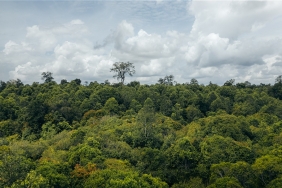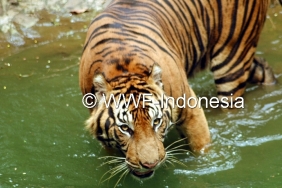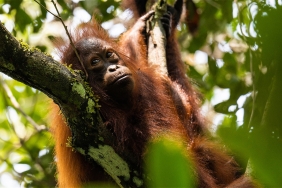GLOBAL TIGER DAY 2019: CULTURAL ARTS APPROACH AND EFFORTS TO RESTORE THE RIGHT TO LIFE OF THE SUMATRAN TIGER
Bogor, July 27, 2019 - In order to commemorate Global Tiger Day which falls on July 29, 2019, at Gunung Pancar, Bogor Regency, West Java, Saturday, July 27, 2019, WWF-Indonesia collaborated with musician Tuan Tigabelas, a young rapper from Sumatra to hold a "Concert-vation: Concert and Conservation". This activity is a neat combination of cultural arts activities in the form of concerts, album launches, and songs that tell the fate of tigers with educational activities in the form of conservation discussions. This activity aims to build mutual awareness so that all levels of society can contribute according to their respective capacities in the success of various Sumatran Tiger conservation initiatives.
The Sumatran tiger (Panthera tigris sumatrae) is Indonesia's last tiger, after the Bali tiger was declared extinct in the 40s and the Java tiger in the 80s. Sumatran tigers are scattered in small populations inside and outside conservation areas. However, their survival and existence continues to face the harsh reality of poaching, illegal trade and habitat loss due to land conversion or climate change. The world body in charge of nature conservation, the International Union for Conservation of Nature/IUCN, in 1996 declared the Sumatran tiger to be on the red list due to the serious threat of extinction in the wild. The 2018 Conservation Action Plan Strategy Document of the Ministry of Environment and Forestry states that the Sumatran Tiger population is only around 600 individuals.
Since 2014, WWF-Indonesia has been actively involved in a global initiative for tiger conservation called 'Double the Tiger or Tx2', an effort to double the tiger population by 2022. To encourage the achievement of the Tx2 target, WWF-Indonesia and the Riau Natural Resources Conservation Center (BBKSDA) formed a patrol team to respond quickly to activities related to direct and indirect threats to Sumatran Tigers and other wildlife in the Bukit Rimbang Bukit Baling Wildlife Reserve area, Riau. The team also conducts regular patrols, investigations, and awareness raising to the surrounding communities.
Currently WWF-Indonesia is also conducting groundbreaking research on Sumatran Tigers in Bukit Barisan Selatan National Park, Lampung by placing 79 hidden cameras to estimate population size, habitat and distribution to identify wildlife corridors that need protection. Another form of seriousness, WWF-Indonesia runs the "Stop Illegal Trade in Protected Wildlife" campaign in collaboration with various partners, including the Indonesian Police Criminal Investigation Agency, the government and the community to respond and break the chain of poaching cases and illegal trade in protected animals.
The importance of the role and function of tigers in the circle of nature and living things is no longer a matter of debate. In 2010, the St. Petersburg Tiger Summit in Russia launched Global Tiger Day, which falls every July 29. The main purpose of Global Tiger Day is to raise awareness among global citizens that tigers have the right to live, receive proper protection, and have room to move in the form of a large living habitat.
In addition to interventions carried out directly in tiger conservation areas, WWF-Indonesia continues to be consistent in voicing messages and education to every level of society about the importance of the value of tigers for human life and the universe. On the occasion of the open talk at the Concert-vation, WWF-Indonesia presented speakers Febri Anggriawan Widodo, Habitat and Connectivity Management Coordinator and two researchers involved in the Sumatran Tiger conservation program.
"In the whole world, there are only 11 countries that are the original habitat of tigers, Indonesia is one of them. Tigers have long been an icon of Indonesian pride. Sadly, 2 out of 3 tiger species in Indonesia are already extinct and the remaining tigers are now in critical status. This last hope must be preserved at all costs, including cultural approaches," said Ade Swargo Mulyo, Director of Partnership WWF-Indonesia.
"The character and charisma of tigers are often associated with symbols of leadership and strength, so it is not surprising that tigers have become logos of institutions, emblems of organizations and mascots of football teams in Indonesia. Tigers are often found in works of art such as stories, songs, movies and paintings. That's why WWF-Indonesia adopted the tagline 'Sumatran Tigers are the Pride of Indonesia' and chose an arts and culture approach to raise the Indonesian public's pride in this charismatic and iconic species. Drawing on the treasures of cultural arts, this year's Global Tiger Day commemoration, WWF-Indonesia collaborates with musician Tuan Tigabelas who has long used tigers as a source of inspiration. His anxiety over the fate of tigers gave birth to a music album titled 'Harimau Soematra' and the song 'Last Roar'. Part of the proceeds from the sale of this album is donated to help the Sumatran Tiger conservation program and we appreciate the real contribution of musicians like this," Ade continued.
"I am a man from Sumatra. I often use tiger analogies in my song lyrics. It started with educating myself, reading and finding out about tigers, including from WWF-Indonesia. That's how I learned the facts about Sumatran tigers, which turned out to be very sad," said Upi, whose real name is Tuan Tigabelas. "In the past, humans lived in harmony with nature and shared space side by side with tigers to maintain balance. This message must continue to be echoed so that the existence of the Sumatran Tiger will survive from generation to generation. We are obliged to restore the right to life and proper protection for the Sumatran Tiger, for the benefit of humanity as well, both present and future generations," concluded Tuan Tigabelas.
- DONE-
For more information, please contact:
Karina Lestiarsi, Media Relation Specialist | Email: klestiarsi@wwf.id | Phone +62 852 181 616 83
About WWF-Indonesia
WWF-Indonesia is an independent national organization and part of WWF's global network. Starting work in Indonesia in 1962 with the Javan rhino study in Ujung Kulon, WWF-Indonesia is currently active in 34 fieldwork areas in 17 provinces ranging from Aceh to Papua. Supported by around 500 staff, WWF-Indonesia works closely with the government, local communities, the private sector, NGOs, civil society and the public at large. Since 2006, WWF-Indonesia has been supported by around 100,000 domestic supporters. Visit www.wwf.id




